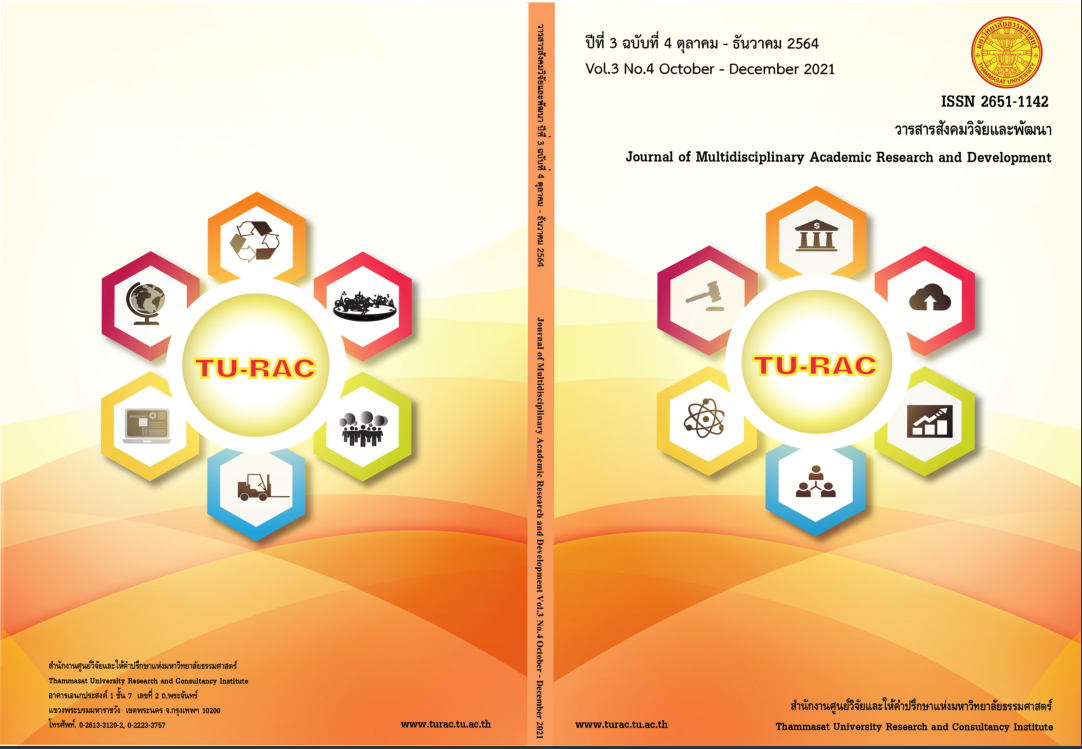Early Childhood Education Management for Citizenship in the Digital World: Lessons from Abroad
Keywords:
Early childhood education management, Citizenship, Digital world, Early childhood development, GrowthAbstract
The purpose of this research is to study and analyze the management of early childhood education for citizenship in the digital age of six countries including Singapore, Hong Kong, Israel, New Zealand, Finland, and Sweden in order to investigate the early childhood education models in which enhancing the fundamental developments of physical, socio-emotional, intellectual and characteristics for early childhood and supporting the growth of them in the digital world in each region of the world. This research uses a qualitative research method, and it is a documentary research from data collection related to early childhood education management covering the curriculum preparation and educational personnel production. The data was then used to analyze the content and present it in a descriptive and analytical form. The results showed that early childhood education management of six countries have the learning management models which based on the context of each country and have an educational philosophy for the 21st century approach : child-centeredness, holistic development, active learning, social interaction and learning, play-based approach, and children’s freedom and multi-intelligence concerning with the goal to develop children physically, emotionally, mentally, socially, intellectually and personality and become citizens with the skills and competencies appropriate for the digital world. In the educational personnel production, it was found that in all countries has determined the minimum qualifications, academic criteria, and teaching-practiced experience, including having a responsible agency and providing training to meet the required qualifications.
References
กุลยา ตันติผลาชีวะ. (2551). รูปแบบการเรียนการสอนปฐมวัยศึกษา. กรุงเทพฯ: เบรน-เบส บุ๊ค.
จิตติมา วรรณศรี. (2553). การศึกษาดูงานด้านการพัฒนาครูในนิวซีแลนด์. วารสารศึกษาศาสตร์ มหาวิทยาลัยนเรศวร. 12(2), 195-200.
จีระพันธุ์ พูลพัฒน์ และ คำแก้ว ไกรสรพงษ์. (2543). การเรียนรู้ของเด็กปฐมวัย ตามแนวคิดมอนเตสซอรี่. กรุงเทพฯ: สำนักพิมพ์ บริษัทอมรินทร์พริ้นติ้งแอนพับลิซซิ่ง จำกัด (มหาชน).
ทิศนา แขมมณี. (2562). ศาสตร์การสอน: องค์ความรู้เพื่อการจัดกระบวนการเรียนรู้ที่มีประสิทธิภาพ. พิมพ์ครั้งที่ 23. กรุงเทพฯ: สำนักพิมพ์แห่งจุฬาลงกรณ์มหาวิทยาลัย.
เยาวพา เดชะคุปต์. (2542). การศึกษาปฐมวัย. กรุงเทพฯ: เอพี กราฟฟิคส์ ดีไซน์.
วรพจน์ วงศ์กิจรุ่งเรือง และ อธิป จิตตฤกษ์. (2554). ทักษะแห่งอนาคตใหม่: การศึกษาเพื่อศตวรรษที่ 21. กรุงเทพฯ : โอเพ่นเวิลด์ส.
วัฒนาพร ระงับทุกข์. (2563). สมรรถนะเด็กไทยในยุคโลกพลิกผัน (VUCA World). คุรุสภาวิทยาจารย์. 1(1), 8-18.
วิจารณ์ พานิช. (2558). เรียนรู้สู่การเปลี่ยนแปลง, กรุงเทพฯ: มูลนิธิสยามกัลมาจล.
ศศิพันธุ์ เปี๊ยนเปี่ยมสิน, นงเยาว์ นุชนารถ, กรณิศ ทองสอาด, ชนม์ทิดา ยาแก้ว, นิศารัตน์ อิสระมโนรส, และ ชนิสรา ใจชัยภูมิ. (2553). เอกสารประกอบการสอน กระบวนวิชา การศึกษาปฐมวัย Early children education. กรุงเทพฯ: คณะครุศาสตร์ มหาวิทยาลัยสวนดุสิต.
สถาบันวิจัยเพื่อการพัฒนาประเทศไทย. (2558). กฎหมายของประเทศสิงคโปร์และข้อมูลกฎหมายที่เกี่ยวข้องกับ สังคม วัฒนธรรม การเมือง และความมั่นคงของประเทศสิงคโปร์. กรุงเทพฯ: สำนักงานคณะกรรมการกฤษฎีกา.
สมสุดา มัธยมจันทร์. (2560). เอกสารประกอบการสอน การจัดการศึกษาและหลักสูตรสำหรับเด็กปฐมวัย. สืบค้นเมื่อวันที่ 18 กรกฎาคม 2564 จาก https://word5148.files.wordpress.com/2018/10/21223-4.pdf.
สุภาวดี หาญเมธี. (2561). คู่มือพัฒนาทักษะสมอง EF Executive Function สำหรับครูปฐมวัย. กรุงเทพฯ: เอกพิมพ์ไทย.
สุริยา ฆ้องเสนาะ. (2561). ฟินแลนด์กับความสำเร็จด้านการศึกษา. เอกสารวิชาการอิเล็กทรอนิกส์ สำนักงานเลขาธิการสภาผู้แทนราษฏร. สืบค้นเมื่อวันที่ 15 กรกฎาคม 2564, จาก https://www.parliament.go.th/library.
สํานักงานคณะกรรมการการศึกษาขั้นพื้นฐาน กระทรวงศึกษาธิการ. (2559). คู่มือบริหารจัดการเวลาเรียน“ลดเวลาเรียน เพิ่มเวลารู้” ปีการศึกษา 2559. กรุงเทพฯ: สํานักงานคณะกรรมการการศึกษาขั้นพื้นฐาน.
สำนักงานเลขาธิการสภาการศึกษา กระทรวงศึกษาธิการ. (2559). รายงานผลการศึกษาการพัฒนามาตรฐานการศึกษาของต่างประเทศ. กรุงเทพฯ: 21 เซ็นจูรี่ จำกัด.
Bucholz, B.A., DeHart, J. and Moorman, G. (2020). Digital Citizenship During a Global Pandemic: Moving Beyond Digital Literacy. U.S. National Institutes of Health's National Library of Medicine. 64(1), 11–17. Retrieved June 1, 2021, from https://www.ncbi.nlm.nih.gov/pmc/articles/PMC7405058/.
Churches, A. (2009). Bloom's Digital Taxonomy. Retrieved May 28, 2021, from https://www.researchgate.net/publication/228381038_Bloom's_Digital_Taxonomy.
Education Bureau. (2020). Overview of Kindergarten Education in Hong Kong. Retrieved July 20, 2021, from https://www.edb.gov.hk.
European Commission. (2021a). Initial Education for Teachers Working in Early Childhood and School Education in Finland. Retrieved July 15, 2021, from https://eacea.ec.europa.eu/.
European Commission. (2021b). Initial Education for Teachers Working in Early Childhood and School Education in Sweden. Retrieved July 15, 2021, from https://eacea.ec.europa.eu/.
Finnish National Agency for Education. (2021). National Core Curriculum for ECEC in a Nutshell. Retrieved July 25, 2021, from https://www.oph.fi.
Ministry of Foreign Affair, Israel. (2021). Education: Preschool Education. Retrieved July 20, 2021, from https://mfa.gov.il.
Ministry of Education, New Zealand. (2021). Te Whariki: Information and resources about Te Whariki, the curriculum for early learning. Retrieved July 20, 2021, from https://www.education.govt.nz.
Ministry of Education, Singapore. (2013). Enhancing the quality of early childhood curriculum in Singapore. Retrieved July 25, 2021, from www.oecd.org/edu/school/Item%206b%20-%20Singapore%20PDF.pdf.
New Jersey Minority Educational Development. (2020). World Best Education Systems. Retrieved January 12, 2020, from https://worldtop20.org.
OECD. (2019). Education at a Glance. Retrieved July 15, 2021, from http://www.oecd.org/education/education-at-a-glance/EAG2019_CN_ISR.pdf.
Schrum, L &Ta Levin, B.B, (2009). Leading 21st Century Schools: Harnessing Technology for Engagement and Achievement. California: Corwin.
Schumacher, T. (2008). The Education System of Israel. Retrieved July 18, 2021, from https://www.nationalexamination.com/study_abroad_info/00000036_Study_in_Israel.pdf.
Singapore Government. (2021). Singapore Residents by Age Group, Ethnic Group and Gender, End June, Annual. Retrieved July 25, 2021, from https://data.gov.sg.
Stat NZ. (2018). "2018 Census population and dwelling counts. Retrieved July 20, 2021, from www.stats.govt.nz.
Tan, C.T. (2017). Enhancing the quality of kindergarten education in Singapore: policies and strategies in the 21st century. International Journal of Child Care and Education Policy. 11(7), 1-22.
Wong, J.M.S. & Rao, N. (2015). The evolution of early childhood education policy in Hong Kong. International Journal of Child Care and Education Policy. 9(3) Retrieved July 20, 2021, from https://ijccep.springeropen.com/articles/10.1007/s40723-015-0006-y.



